Celebrating the ‘impeccable integrity and unbounded courage’ of Brent Scowcroft
On August 22, a memorial service was held to honor the life and legacy of General Brent Scowcroft, chairman emeritus of the Atlantic Council, president of the Scowcroft Group, and a former national security advisor to the President of the United States.
Looking back on his time working with Scowcroft in the Nixon administration, former US Secretary of State Henry Kissinger explained that “in a period when America was tearing itself apart,” Scowcroft’s “steadiness had a calming influence then as did his faith in his country’s ultimate purposes.” Former US Secretary of Defense Robert Gates argued that what “set Brent apart as National Security Advisor was that he played fair…he did not take advantage of his close relationship with the president to disadvantage others.” John Deutch, former Director of Central Intelligence, recalled that “Brent had the ideal temperament to lead the country. He was smart, deceptively articulate with a calm demeanor that often masked his strategic thinking.”
Veteran diplomat and president of the Council on Foreign Relations, Richard Haass, highlighted Scowcroft’s value as a mentor to many US policymakers. “It was impossible not to learn from Brent,” he said. “He mentored by example. He was open to argument, fair-minded, curious, willing to change his mind and admit error, demanding but at the same time decent and generous.” Virginia Mulberger, founding principal at the Scowcroft Group, noted that “among the staff over the years that [Scowcroft] actively mentored, supported, and promoted are Directors of the CIA, NSA, Secretaries of State, Defense, National Security Advisors, and senior staff in all national security departments and agencies.”
Stephen Hadley, a former US national security advisor, summed up Scowcroft as “a true gentleman, in the best sense of the word, much loved by all who had the privilege of working with him.”
Below are the full tributes from the memorial service honoring the life and legacy of General Brent Scowcroft. Click below to jump to a specific tribute.
Henry Kissinger: Scowcroft was “a kind of conscience for all”
That Brent Scowcroft has left us is difficult to absorb. For over half a century, he had been part of my life as a colleague, a friend, and a kind of national conscience.
Brent and I met on President Nixon’s White House staff—he as military aide, I as security advisor. Brent’s duties included managing Air Force One and, when Nixon flew, accompanying him. That is how Brent and I came to know each other: during long flights in conversations on international affairs, especially about Russia, his academic specialty, and occasionally about the complexities of the Washington bureaucracy as well as its idiosyncrasies.
When, in 1972, General Alexander Haig, then my deputy, was appointed NATO Commander, President Nixon generously permitted me to recommend Haig’s replacement. I selected Brent, who had not sought the position. A kind fate guided me. Brent brought important dimensions: impressive intelligence, exceptional administrative skills, and a self-effacing tenacity in pursuit of the national interest. Combined with an impish sense of humor, this took the tension off the elaboration of guidelines for the president’s approval, one of the key aspects of the Security Advisor’s duties.
It was a period when America was tearing itself apart in a quest for moral absolutes. There was agreement on the objective—peace—but a deep division on the strategy for pursuing it. Brent’s steadiness had a calming influence then as did his faith in his country’s ultimate purposes. The divisions of that conflict, reappearing periodically, blight our own time.
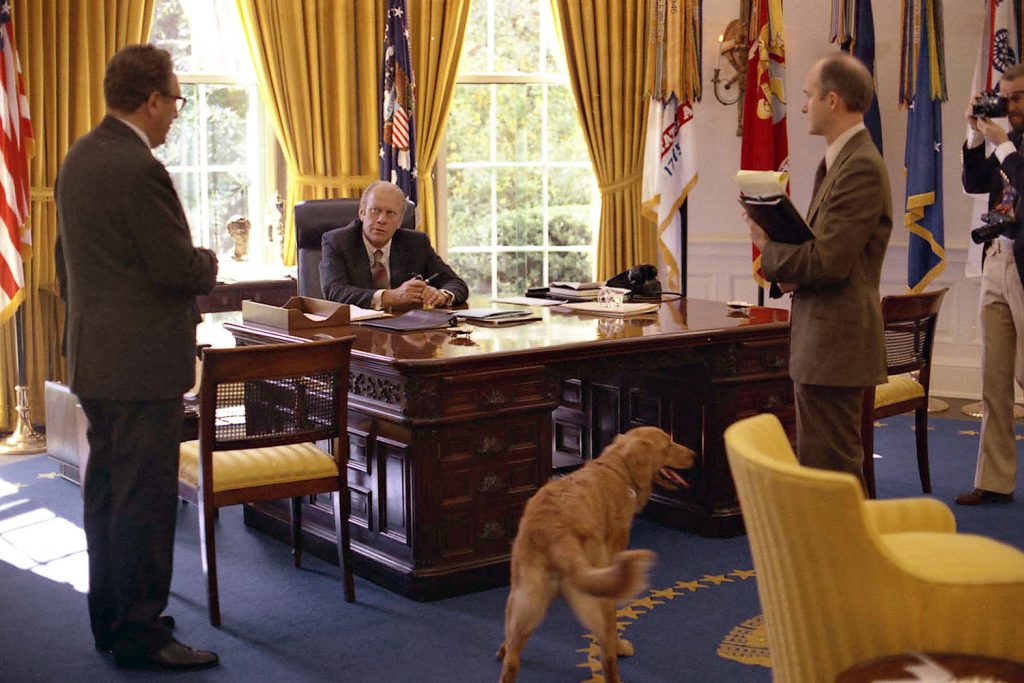
[Brent] achieved the triumph of character over circumstance.
Brent and I worked as a team. This was illustrated in September 1973, when I telephoned him from Moscow about negotiations with Leonid Brezhnev on ending the Middle East war. Brent greeted me with: “Henry, do you realize that we have problems of our own?” I replied impatiently: “What problems can you possibly have in Washington on a Saturday night?” Brent informed me that a determining episode in the Watergate crisis, later labelled the Saturday Night Massacre, had just taken place.
In 1975, after Nixon was replaced by Gerald Ford, Brent was promoted to Security Advisor. Brent’s new status—which preoccupied the media—did not alter our relationship based on friendship and trust, reinforced by both our friendships with President Ford.
In 1989, President George H.W. Bush named Brent as his Security Advisor, making Brent the only individual in American history to be appointed to the position by two different Presidents. Bush’s was an extraordinary foreign policy presidency. The triumvirate of Bush, Jim Baker, and Brent overcame Iraq’s occupation of Kuwait, managed the collapse of the Soviet Union, assisted the unification of Germany, and preserved America’s relationship with China in the building of which Brent had played an important role twenty years earlier. In 1991, as the Bush administration was ending, I sent Brent a note: “No one has served this country more devotedly or more honorably.”
Brent’s service to the country did not end then. He continued to give principled non-partisan advice to senior officials of both parties and countless study groups.
A biographer wrote that honor and patriotism were Brent’s lodestars and that these qualities enabled him to separate fact from fiction and right from wrong. This made him into a kind of conscience for all.
In 2018, on the occasion of my 95th birthday, Nancy invited Brent to a dinner with some 100 special friends. Brent came though, by then, travel had become difficult for him. Nancy seated him on her right. At the end of the dinner, Brent came up to me and, despite the limitations of speech that had frustrated his last years, said something along the lines of a letter he had written me earlier, that our friendship was “one of the most cherished parts of my life.” I replied that his conduct had uplifted me.
Everyone whose life Brent touched will always remember this self-effacing man who fulfilled his life’s purpose of service and, in the process, achieved the triumph of character over circumstance.
Henry Kissinger is a former US Secretary of State and Atlantic Council Board Director. Remarks were delivered by General James L. Jones, Jr., executive chairman emeritus of the Atlantic Council, former commandant of the US Marine Corps, former Supreme Allied Commander, Europe, and former national security advisor to President Obama.
Robert M. Gates: “Impeccable integrity and unbounded courage”
Brent asked me to join the NSC staff on loan from CIA in the spring of 1974, four months before President Nixon resigned. It was a decision I never regretted. He was the best boss I ever had and, over time, he became my best friend. I loved him. And I was far from alone in doing so.
One way or another, I worked with Brent for some forty-five years, most closely under President Ford and then especially President George H. W. Bush. In all the jobs I had thereafter, he was my most trusted counselor and sounding board. He was a world-class strategist and a far-sighted, bold thinker.
Brent is often described as the model National Security Advisor, not least because other senior officials—especially Jim Baker and Dick Cheney—trusted him to faithfully represent their views to the president. But Brent was far from a passive rapporteur or great policy traffic cop. He had strong views and was never shy about putting them forward.
As a matter of fact, Brent loved to argue. He and I argued all the time when I was his deputy. He argued with Larry Eagleburger, Condi Rice, Bob Blackwill, Richard Haass, Ginny Lampley, Arnie Kanter ,and so many more—he relished the give-and-take with people he respected and liked. And, on those rare occasions when he yielded a point, it was always grudging. Those he argued with the most, loved him the most. And that is telling.
What set Brent apart as National Security Advisor was that he played fair—he never blind-sided his colleagues, he never disparaged others to the president, he facilitated getting unhappy senior officials in to see the president, he did not take advantage of his close relationship with the president to disadvantage others.
Beyond his deep commitment to protect America and to do so respecting the law, orderly process, and the institutions of government, Brent was singularly focused on protecting the presidency itself. His calm demeanor, personal humility, and sense of humor masked the fact that he could get mad. I mean truly angry. And his temper nearly always was ignited by the same match: whenever officials in the White House or elsewhere in government placed their personal interests above those of the president.
When other officials’ actions added to the president’s burdens, flouted the authority of the president, or claimed credit for achievements that were rightfully the president’s.
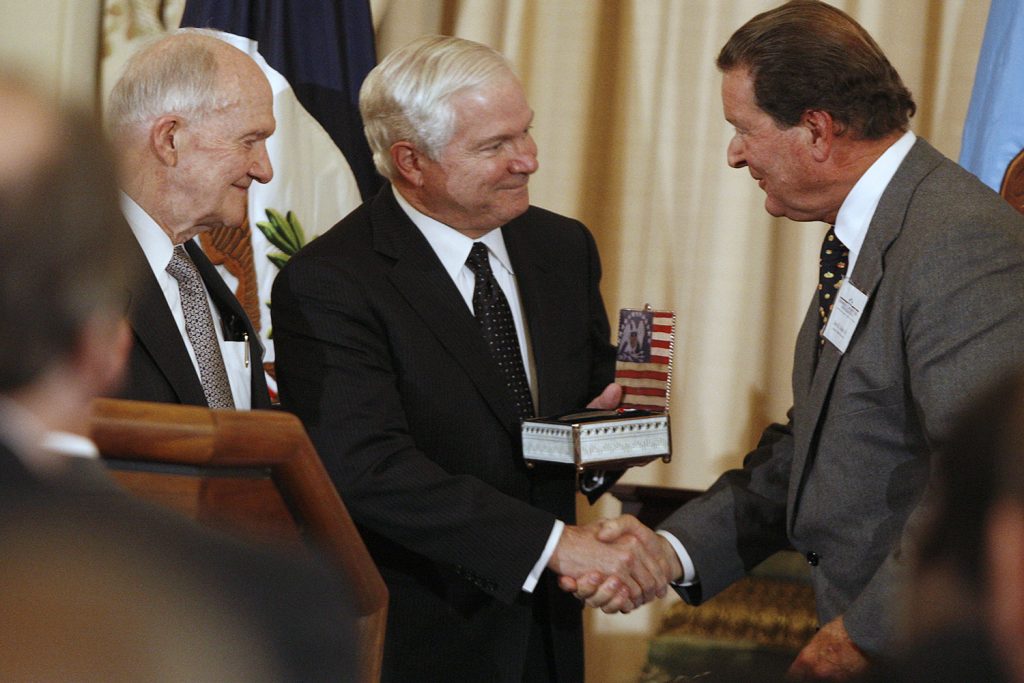
Those he argued with the most, loved him the most.
Brent demanded excellence and hard work but, at the same time, he was truly fun to work for. He had a high tolerance for being teased. You may remember that Brent got into some hot water when the president sent him and Larry Eagleburger to China after the tragedy at Tiananmen Square and Brent gave a dinner toast that proved controversial. After that, before an official dinner with some particularly obnoxious foreign leader, I’d ask Brent if he was going to give the toast. After he and 41 came up with the notion of the New World Order one summer up in Maine, I’d tell Brent and others that the New World Order is what you get when the bluefish aren’t biting.
Then, of course, there was the now-famous Scowcroft Award, created by 41 to recognize the senior official who most obviously fell asleep in a meeting with the president. An award Brent won many times. My favorite was one time in the Oval Office with a particularly boring foreign leader. Jim Baker, Brent, and I were seated on the couch. Brent got drowsy, scooted forward to the edge of the couch and put his elbows on his knees, his chin in his hands. He fell asleep, his elbows slipped off his knees, and he pitched forward, headed directly for the flower arrangement on the president’s coffee table. I stuck my arm out in time to catch him and eased him back on to the sofa.
But there is a back story to the daytime naps. After a long and stressful day at the White House, Brent would go home to take care of his ailing wife Jackie, doing the laundry, the cooking, the housecleaning. More than once I heard from someone who had spotted Brent at the neighborhood grocery store at midnight.
The only times I ever went behind Brent’s back with the president were when Jackie was in the hospital. Brent wouldn’t leave the office in the evening until the president had gone to the residence and so I would sneak down to the president’s study off the Oval Office and tell him Jackie was in the hospital and he needed to head to the residence early so Brent could go to the hospital. After Brent left, I’d give the all clear, and 41 would return to the Oval.
Brent’s deep love of family obviously centered on Karen and, later in life, Meghan. Mentioning Karen or Meghan to Brent was guaranteed to bring a smile to his face and a twinkle to his eye.
I suppose this is the proper point to correct the historical record and recent newspaper stories in one important respect. Who would ever imagine that the ascetic-looking high priest of national security really and truly liked a good vodka martini—Chopin, very dry, straight up, with a lemon twist.
There are very few men and women in the American public arena who, in a lifetime of service to our country, have earned and kept the respect, admiration and even the affection of all who knew them, in and out of government. Brent was one of those all too rare figures. Tough as nails on matters he cared about, Brent was at the same time the most decent, kindest, and humble person I have ever known. A man of impeccable integrity and unbounded courage, he was a true patriot—an American icon. And the best friend anyone could ever have.
Robert M. Gates is a former US Secretary of Defense.
Stephen J. Hadley: Scowcroft is the “author of the modern National Security Advisor”
It is said that Henry Kissinger was the creator of the modern National Security Council system. And that is largely true. But Brent Scowcroft was the creator of the modern National Security Advisor.
Brent established the model: the honest broker, enjoying the confidence of his national security colleagues while running a fair and open decision making process; the trusted counselor, sharing his advice privately with the President; the modest professional, working largely behind the scenes and off stage; a power player, to be sure, but with his ego well in hand; ready to give credit to others for success, and to accept responsibility for failure.
Brent created a culture within the National Security Council staff that although strained from time to time largely endures to this day: support for the president regardless of party, putting the national interest ahead of politics, working long hours without complaint.
This was the tradition of selfless service, high integrity, and unflagging commitment that Brent established within the NSC staff and bequeathed to his successors as National Security Advisor.
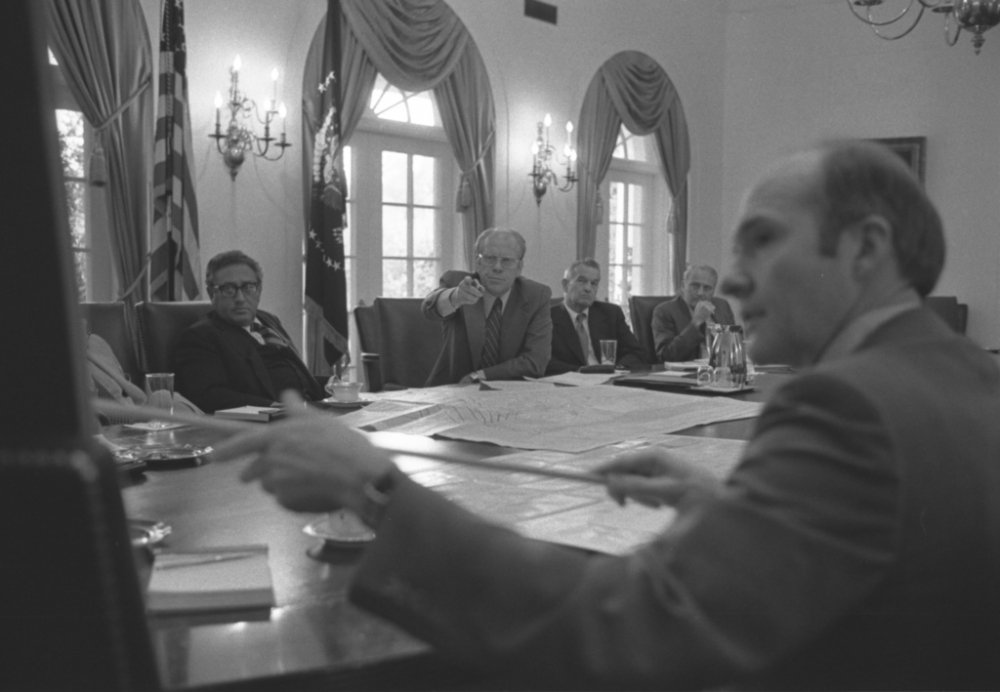
There are few people in Washington who were as respected and revered as Brent Scowcroft.
But Brent was virtually unique among National Security Advisors. For his personality, temperament, and character perfectly fit the model that he established for the office. A person of humility, but with enormous personal and intellectual gifts. Someone who treated everyone with respect—from foreign leaders to personal staff. Strong in his conviction that America at its best could be a force for good in the world. A confident man who attracted the nation’s finest to his NSC staff—and was secure enough to listen to them. Someone who always brought a unique perspective to the conversation, while insisting on intellectual rigor—and always asking, “so what is the strategy?” And when your answer failed to meet Brent’s high standards, as it almost invariably did, Brent would tell you frankly that you had not persuaded him. But then, with that wonderful smile and great laugh of his, cheerfully invite you back to try again any time! A person of bipartisan instincts—who worked across the political aisle and at both ends of Pennsylvania Avenue, and who staunchly defended principle and advanced American interests. And finally, that rarest of commodities—especially in Washington—a wise man, someone to whom it was worth listening.
There are few people in Washington who were as respected and revered as Brent Scowcroft. It was not just because of what he did, although his accomplishments were many. It was because of who he was. A true gentleman, in the best sense of the word, much loved by all who had the privilege of working with him. That was Brent Scowcroft. We will not see his like again.
May the Lord’s blessing be upon him, always.
Stephen J. Hadley is executive vice chair of the Atlantic Council board of directors, a principal of Rice, Hadley, Gates & Manuel LLC, and former US National Security Advisor.
Richard N. Haass: “Mild-mannered, but there was nothing mild about his intellect”
I was doing research in the Bush presidential library in College Station Texas—that’s Bush 41—and came across an previously undisclosed memorandum. It turns out President-elect Bush called Brent soon after the November 1988 election and asked him to be his national security advisor even though Brent had held that same job in the Ford administration. “After all, Brent,” the president explained, “you know the job so well you could do it with your eyes closed.”
Brent took 41’s words to heart, and slept through significant portions of the Bush presidency. That part is true, even if the conversation with the president never happened and no such memorandum exists. That didn’t stop Brent from laughing heartily at the story and at himself every time I told it.
It was in the late 1970s or early 1980s when we first met. Truth is we didn’t know each other all that well when he asked me to come work on the Middle East on the National Security Council. After a day of thinking it over, I called back and said yes. It was the best professional decision I ever made.
It was also one of the best personal decisions. It was impossible not to learn from Brent. He mentored by example. He was open to argument, fair-minded, curious, willing to change his mind and admit error, demanding but at the same time decent and generous. I can still see him sitting in his chair, unmoving for what seemed like minutes, as he pondered the implications of some new information he’d received.
It is hard to explain how a job that required fourteen hours a day, six or seven days a week filled with interagency meetings, a job that caused me to miss my honeymoon so I could travel to Europe and the Middle East with the president and Brent, could be fun, but it often was.
Saturdays were my favorite time, as Brent, Bob Gates, and I would often meet in Brent’s West Wing office. Brent would be lying on the couch, awake but with his eyes closed, the two of us in chairs. We would talk about everything and everyone, alternating what was serious with howls of laughter. The conversation ranged from grand strategy to grand gossip. One morning Bob said, “You guys realize, it’s never going to be better than this.” He was right.
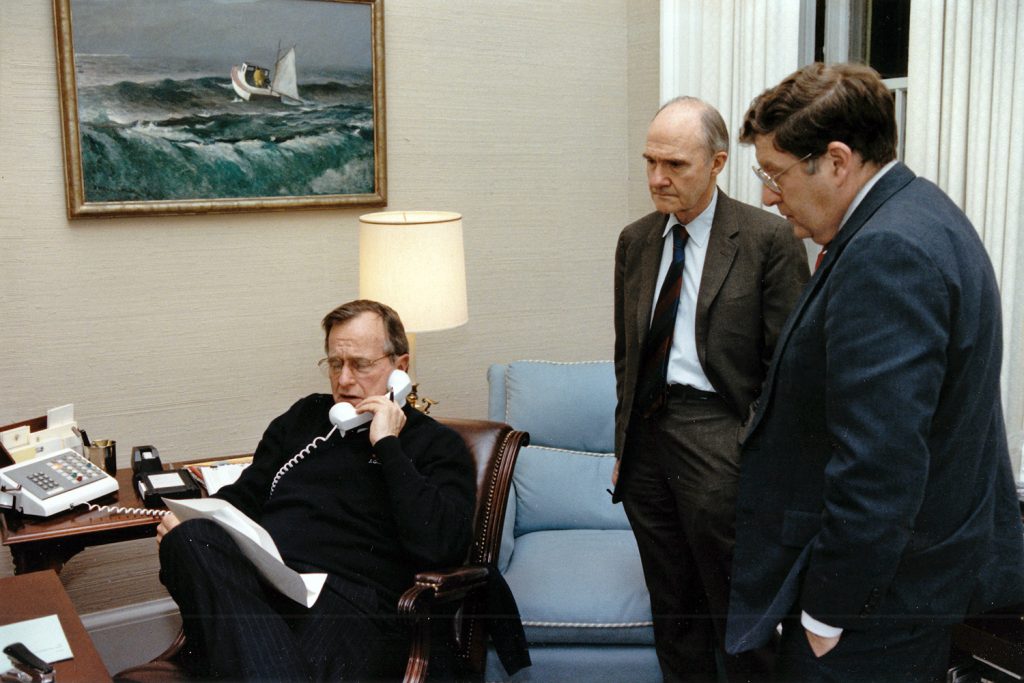
It was impossible not to learn from Brent. He mentored by example.
Most observers would agree that we—and by “we”, I mean the Bush administration—did ok too. The administration succeeded in ending the Cold War peacefully with a unified Germany in NATO, in building an international coalition that liberated Kuwait and ensured the post-Cold War era would not begin with an unanswered act of aggression, in bringing together Israelis and Arabs for the first time to openly discuss peace. No administration since Truman’s has had a better foreign policy record.
This success was due in no small part to the gentleman we remember today. For good reason Brent is viewed as the gold standard of NSAs. Brent got the balance right, between being a counselor to the president and the guarantor of due process for everyone else.
A realist to his core, he thought the principal purpose of American foreign policy should be to shape the foreign policies of others, not transform them. He worked to protect the Sino-American relationship after Tiananmen at a time many others advocated for something very different. He pushed Israel to make peace; he was wary of being drawn deeply into the Balkans. Years later, he opposed the 2003 Iraq war and supported the JCPOA with Iran. Brent had the courage of his convictions, even when they went against foreign policy orthodoxy or were unpopular.
Native-born Israelis are called sabras, a fruit that is tough on the outside and soft on the inside. Brent was more the opposite. He was mild-mannered, but there was nothing mild about his intellect. He challenged the military when he didn’t think much of its proposed plans for liberating Kuwait. He had strong views about just about everything and everyone.
I remember a moment early in the Gulf crisis. As a first step, the president wanted to send American troops to Saudi Arabia, to make sure Saddam did not add to his conquests. The secretary of defense was to lead a US delegation to the Kingdom. The Saudis were reluctant to commit in advance to hosting US troops. Brent called in Prince Bandar, the Saudi ambassador, and told him no commitment, no delegation, no troops. If Saudi Arabia wanted American help, Brent suggested that he get the king on the phone there and then to get his agreement. The rest as they say is history.
Brent left government in January 1993 more than a little frustrated as there was much he wanted to do in a second term that he expected 41 would have. We had grown close by then and grew closer over the next three decades. I said before that Brent was a mentor; he was also a friend and, at times, a father to me. He would pull for me, go easy when I came up short, laugh with me and, when deserved, laugh at me. I loved him, as did Susan. The love was fully requited.
These remarks began with a reference to the running joke of Brent’s tendency to doze off. The Scowcroft Award, given to whomever nodded off most ostentatiously in meetings, was aptly named. Today, though, Brent alone receives the award as he goes to his final rest. May his memory always be for a blessing.
Richard N. Haass is president of the Council on Foreign Relations, former director of policy planning at the US State Department, and veteran diplomat.
Virginia A. Mulberger: Devotion to service, colleagues, and family
On behalf of Karen, Meghan, and the Scowcroft family, thank you all for being here today. You were all very special to him.
There is so much that seems wrong with our society and our world these days. Yet, we are given hope. We have just heard, from friends and former colleagues, how one man lived a life of such value, morals, and dedication to doing good, that he has left a permanent mark in history. A mark for others to admire, study and, hopefully, emulate for generations to come.
I want to take just a few minutes to talk about a more personal side of this man…an attribute which resonates love, loyalty, and dedication…and that is devotion. I’ve known Brent for thirty-seven years…as a mentor, boss, colleague, friend, and truly, a dear family member. What I have been witness to, and recipient of all these years, is this man’s incredible devotion to all for whom and that which he cared…and he cared deeply.
His devotion to his country always came before personal gain…from his first day in Beast Barracks at West Point…to when he voluntarily resigned as a three-star Air Force General because he didn’t feel it appropriate for a National Security Advisor to be an active duty officer.
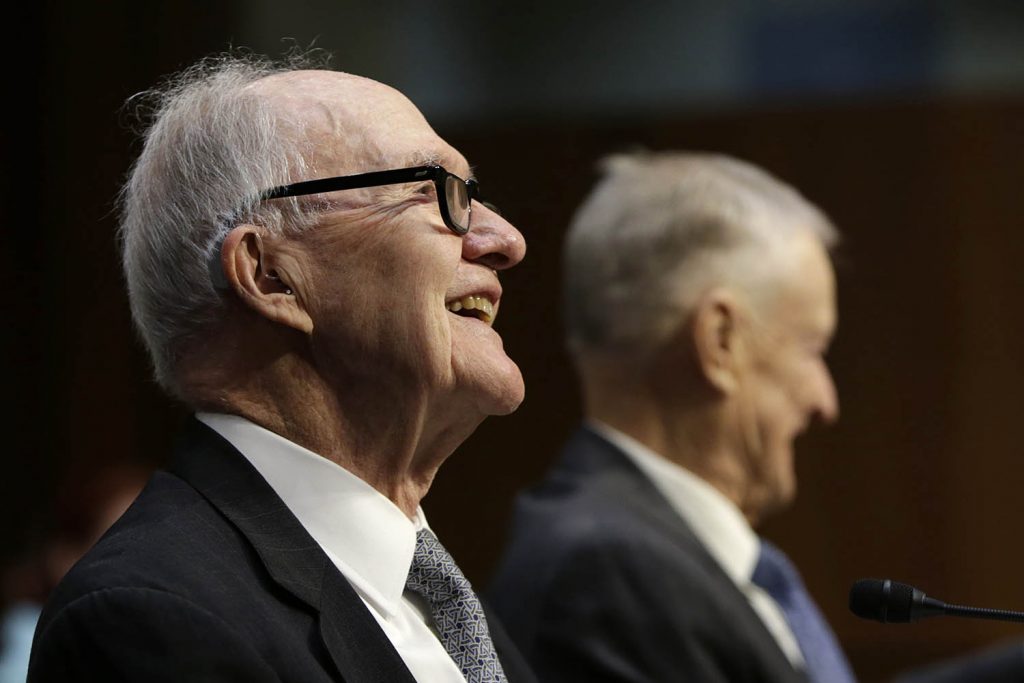
He could spot talent and wanted to ensure that our country got the very best.
He was devoted to the presidents he served… Nixon, who he said was a flawed, troubled soul but with a sharp foreign policy mind; Ford, who he believed to be one of the most decent people he had ever met and exactly what the country needed at that time. And then, of course, President Bush 41…who he called “one of his dearest friends and the most prepared person ever for the Presidency.” He was devoted to more than just the individuals…he held the Office of the President in the highest esteem, regardless of political party…serving, as you have heard, on commissions, boards, and as an advisor to all presidents following Bush 41 through President Obama.
His devotion went both ways. Among the staff over the years that he actively mentored, supported, and promoted are Directors of the CIA, NSA, Secretaries of State, Defense, National Security Advisors, and senior staff in all national security departments and agencies. He could spot talent and wanted to ensure that our country got the very best. He hailed the virtues of government service and never failed to give the most junior of interns his attention, when needed.
Lastly, but most importantly and less known, was his incredible devotion to his family. Bob mentioned previously that Brent was caring for his ailing wife, Jackie, while National Security Advisor. Jackie was basically housebound for fifteen years. For those fifteen years, Brent prepared virtually all their meals, administered her medicines, and comforted her by sleeping on a narrow couch by her bed in their living room. Jackie had been his nurse when he broke his back in pilot training…Brent returned that nursing tenfold, all while working relentless hours under enormous pressure. Thirteen years later, when his first and only grandchild, Meghan, was born, Brent was there and then continued for the next eight years to fly or train every weekend to New York to be with his daughter, Karen, and granddaughter, Meghan…truly, the loves of his life. Devotion runs deep in the Scowcroft family. During those fifteen years while her mother was ailing, Karen came down frequently to help her father. Then in January 2016, when Brent had his first stroke and moved into Goodwin House, Karen and Meghan became regulars on the planes and trains from New York to DC. For the next four years, they came every weekend to comfort, entertain, and brighten his life. I can count on less than one hand the times, prior to COVID, they were unable to make it.
All you had to say to him in these last four years was “your girls will be here on Saturday” and, even in his waning months, when he could no longer vocalize his thoughts, his huge smile said it all. Karen, Meghan, and I were blessed to spend his last few days with him. Between naps, he clung to Karen’s arm and smiled at Meghan for every kiss she gave him on his cheek. Though we weren’t ready, when Karen and Meghan told him they would be alright and he could go to be with his beloved Jackie and dear friends, he waited until they left, then slipped peacefully away.
That is devotion… and Karen and Meghan, he could not have loved you more.
Virginia A. Mulberger is an Atlantic Council board director, founding principal of the Scowcroft Group, and former Special Assistant to the President and Senior Director of Legislative Affairs on the staff of the National Security Council.
John Deutch: “The ideal temperament to lead”
It has always been my opinion that Brent would have been a perfect president of the United States. His breadth of knowledge of foreign affairs and military security was unmatched. As many have noted, his judgment on the actions the country should take on vital security matters involving Russia, China, Iraq, and the Middle East generally was unsurpassed. He understood the character of the American people, its society and respected the country’s diversity. Above all Brent had the ideal temperament to lead the country. He was smart, deceptively articulate with a calm demeanor that often masked his strategic thinking.
I first met Brent at a member of the Commission on Strategic Forces that he chaired for President Reagan. With hindsight the MX issue and its small ICBM solution seems less important today, but the experience left me with an indelible impression of the good sense that Brent brought to issues and the skill with which he managed the egos of the participants.
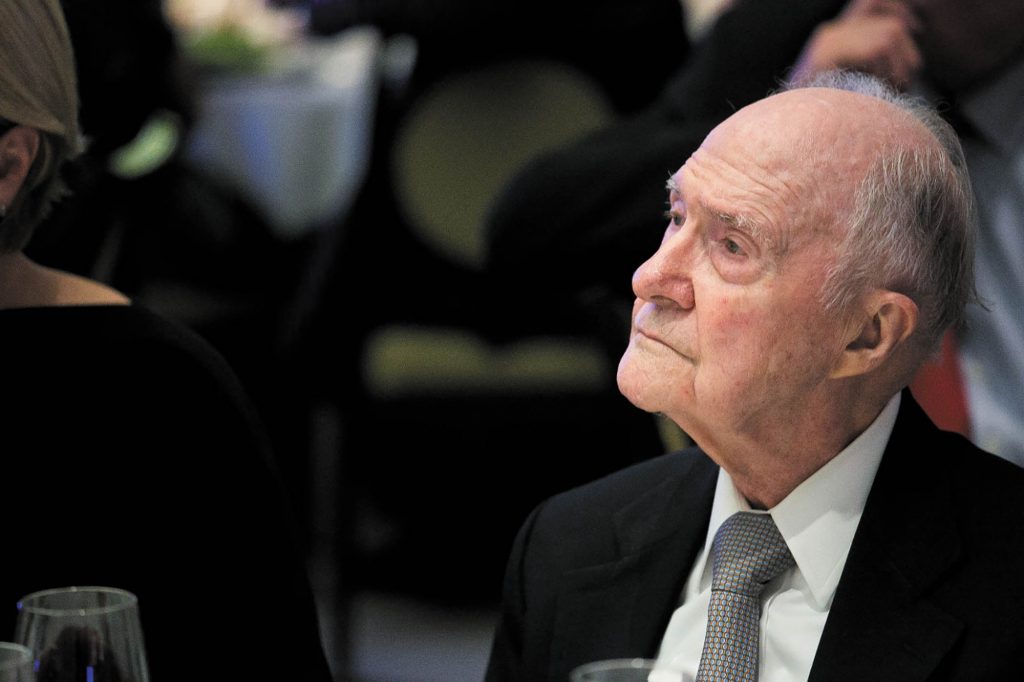
Above all Brent had the ideal temperament to lead the country.
We formed a very strong friendship and worked closely together for many years. I am extremely proud of the baker’s dozen of articles and op-ed pieces that I co-authored with Brent—a not insignificant achievement for a professor of chemistry. President H.W. Bush’ s sensibly small PFIAB chaired by Senator John Tower worked closely with Brent on a number of matters that realigned aspects of President Reagan’s approach to the intelligence community. We also shared a number of consulting assignments embarrassed only once when we discovered each was the lead expert witness for a company in the litigation (but saved by a last minute agreement.) Over the years several of Brent’s close associates became highly valued friends of mine: Arnie Kanter, Dan Poneman, Steve Hadley, and Ginny Mulberger among others.
I was devoted to and loved Brent. We had regular dinners together which were what I treasure most in our relationship. ach dinner had a similar agenda: personal update, present activities and concerns, and then a deep dive into a prearranged issue, such as reviving commercial nuclear power, oil pipelines in the Caspian Sea, CTBT, Pentagon, State Department, and NSC management. My life would have been less meaningful without Brent’s presence, and I miss him sorely.
John Deutch is a former Director of Central Intelligence, former Deputy Secretary of Defense, and emeritus institute professor at the Massachusetts Institute of Technology.